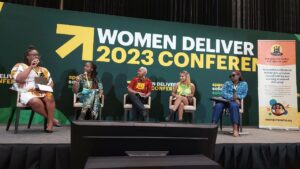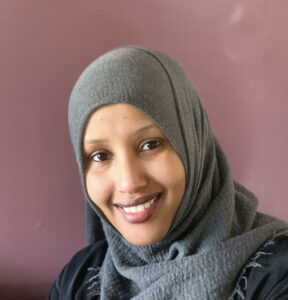This week, grassroots advocates, governments and multilateral organizations, private sector corporations, philanthropies and gender justice activists are all gathering in Rwanda for the Women Deliver conference. Such gatherings are important – certainly in theory – in advancing the cause of gender justice. However, we must move past the rhetoric and follow through with action and accountability.
Moving events like this to the Global South might offer many of us easier visa entry, but steep registration fees still exclude and silence those whose voices should be heard loudest. As a result, only the elite, privileged, and rich people and organizations who can afford it get to participate. A superficial change is never a transformational one.
The priority at this year’s Women Deliver conference is sexual and reproductive health and rights (SRHR). These are fundamental rights that require our collective determination to safeguard. Across the world today, more than 640 million girls and women were married before their 18th birthday. Their unmet need for contraception is resulting in roughly around 121 million unintended pregnancies each year.
Activists from the Global South, particularly the African continent, were relentless in getting these SRHR shaped and adopted. In 1994, during the International Conference on Population and Development (ICPD) in Cairo. They pushed for this paradigm shift among decision-makers, from simply viewing populations as “human numbers” to looking instead at issues that were considered important to achieve balanced development. They pressed governments to deal with these issues, including sexual health, reproductive rights, women’s empowerment and youth reproductive health, in a linked and integrated way. Over 175 countries after that agreed on a Programme of Action to be implemented by 2015.
But these critical steps remain small, not giant strides. The women Deliver conference is another chance for African voices to again front the call on governments to move past the rhetoric toward action.

The African Charter on the Rights of Women in Africa (‘the Maputo Protocol’) is one of the world’s most comprehensive and progressive women’s human rights instruments. We commemorated its 20th Anniversary just last week on 11 July 2023. The protocol implementation has delivered increased political representation for women and enhanced societal understanding and acceptance of women’s SRHR across the African continent.
The Maputo Protocol guarantees women’s right to health, including SRHR, to be respected and promoted. It emphasizes women’s control over their fertility and whether and when to have children, as central to women’s health. It lays out the critical relationship between these rights and access to services, clearly pointing out that a violation of one has a direct effect on the others.
The Undeniable Urgency of Now
Progress in SRHR has been uneven around the world, and it is not hard to see why. Too many governments continue to lack the political backbone to prioritise and invest adequately genuinely. We see a growing anti-gender movement, punitive legislation and the persistence of regressive social norms that permit violence and discrimination against women, girls, and gender diverse people.
Violence against women, girls and gender diverse people globally is increasing sharply. One in three women has experienced physical and sexual violence, and more than 200 million girls and women have undergone female genital mutilation. Same-sex relations are criminalized and can lead to prison in 69 countries or a death penalty in six. Unsafe abortion is one of the leading causes of maternal mortality, with 94% of all maternal mortality happening in low- and middle-income countries.
Many Black and Indigenous women and girls from poor and marginalised communities simply have no access to contraception, safe abortion or pregnancy care or could not afford it if they did. They lack comprehensive sex education, alternative birth options, domestic violence assistance and adequate wages to support their families. Their nearest clinic might be hundreds of kilometres away.
All this means they simply do not have any opportunity even to contemplate “choice”. The cost-of-living crisis has doubled the cost of sanitary pads in many countries. Around 50% of all women and girls worldwide use rags, grass, or paper to manage their periods, which poses a significant risk to their health. Period poverty has been identified as one of the leading causes that perpetuate gender disparities between school-going girls and boys. In Africa, 1 in 10 girls miss school because of lack of access to menstrual products or adequate toilets in school, and they miss up to 50 days of school every year because of period poverty and stigma.
Reproductive justice is inextricably linked to social justice and cannot be achieved without gender justice which, in turn, cannot happen without bodily autonomy and SRHR for all. The mainstream focus has been about choice, but less about access to those choices.
Translating Commitments into Practice
The outcomes from Women Deliver could offer hope and trust for many if it is transformed into a platform where historically marginalised communities lead in the design and provision of SRHR services. That’s the first test that we will be judging it upon.
Secondly, we want to hear bold, high-level advocacy for the decriminalization of abortion and the removal of all the barriers that women face accessing safe, free and quality options in compliance with international human rights commitments. We need to hear that regressive “marry-your-rapist” laws or those that permit marital rape should be repealed.
Lastly, investment –much more investment into robust and feminist SRHR policies and programs is needed. Center Global South feminist organisations to inform the outcomes and fund the work they lead on SRHR beyond this meeting.
Feature photo by Women Deliver.

Amina Hersi is the Head of Gender Rights and Justice at Oxfam.
